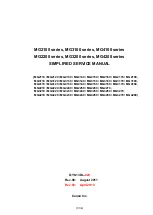
Paper and specialty media guide
Using specialty media
Tips on using card stock
Card stock is heavy, single
‑
ply specialty media. Many of its variable characteristics, such as moisture content,
thickness, and texture, can significantly impact print quality. Print samples on the card stock being considered
for use before buying large quantities.
When printing on card stock:
•
Make sure the Paper Type is Card Stock.
•
Select the appropriate Paper Texture setting.
•
Be aware that preprinting, perforation, and creasing may significantly affect the print quality and cause jams
or other paper handling problems.
•
Check with the manufacturer or vendor to ensure that the card stock can withstand temperatures up to
240°C (464°F) without releasing hazardous emissions.
•
Do not use preprinted card stock manufactured with chemicals that may contaminate the printer. Preprinting
introduces semi
‑
liquid and volatile components into the printer.
•
Use grain short card stock when possible.
Tips on using envelopes
Print samples on the envelopes being considered for use before buying large quantities.
•
Use envelopes designed specifically for laser printers. Check with the manufacturer or vendor to ensure
that the envelopes can withstand temperatures up to 230°C (446°F) without sealing, wrinkling, curling
excessively, or releasing hazardous emissions.
•
For best performance, use envelopes made from 90
‑
g/m
2
(24
‑
lb bond) paper or 25% cotton. All
‑
cotton
envelopes must not exceed 70
‑
g/m
2
(20
‑
lb bond) weight.
•
Use only new envelopes from undamaged packages.
•
To optimize performance and minimize jams, do not use envelopes that:
–
Have excessive curl or twist
–
Are stuck together or damaged in any way
–
Have windows, holes, perforations, cutouts, or embossing
–
Have metal clasps, string ties, or folding bars
–
Have an interlocking design
–
Have postage stamps attached
–
Have any exposed adhesive when the flap is in the sealed or closed position
–
Have bent corners
–
Have rough, cockle, or laid finishes
•
Adjust the width guides to fit the width of the envelopes.
Note:
A combination of high humidity (over 60%) and high printing temperature may wrinkle or seal
envelopes.
Paper and specialty media guide
105
















































